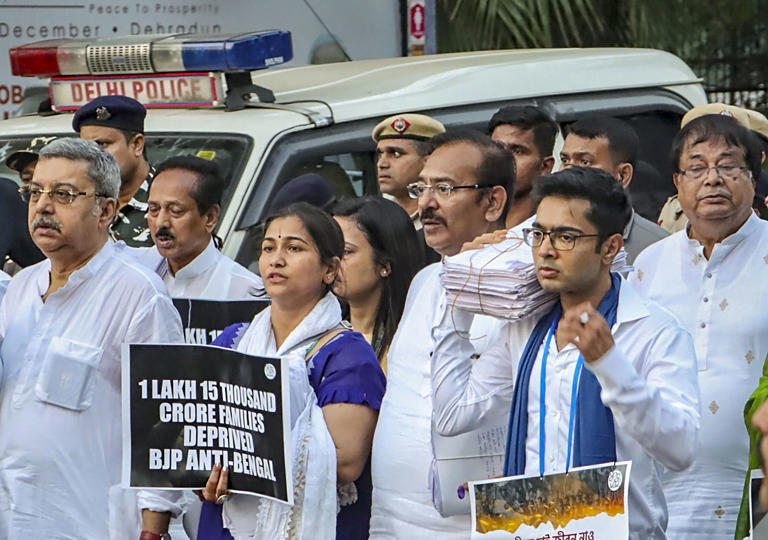Black day for Indian democracy: TMC leader Abhishek Banerjee after release from police detention
The statement by TMC general secretary Abhishek Banerjee reflects a tense political situation in India. Banerjee’s characterization of the day as a “black day for Indian democracy” indicates the party’s strong opposition to recent events.
According to Banerjee, the incident, where public representatives were detained and manhandled by Delhi Police, will serve as an example of what he perceives as a “New India.” The mention of journalists being booked under the anti-terror law UAPA (Unlawful Activities (Prevention) Act) raises concerns about freedom of the press and dissent.
The backdrop of this situation involves a conflict between the Central government and the West Bengal government regarding the release of funds to the state. The TMC (Trinamool Congress) has been actively protesting in the national capital, Delhi, to highlight their grievances. These protests culminated in a sit-in at the Union Rural Development Ministry office, where TMC leaders, including Abhishek Banerjee, were detained and later released.
The TMC’s demonstrations, which included a march to the Rural Development Ministry to submit letters addressed to the Prime Minister and the Rural Development Minister, were met with challenges, as the Minister of State reportedly refused to meet more than five representatives. This refusal led to a standoff between TMC leaders and the ministry.
The situation underscores the complex dynamics of Indian politics, where clashes between the ruling government and opposition parties can lead to confrontations and public protests. It also highlights the ongoing debate over civil liberties, freedom of expression, and the role of dissent in a democratic society.
The sit-in protest led by TMC leaders, including Abhishek Banerjee, extended until around 9 pm when the police detained and subsequently evicted them from the ministry premises. According to Banerjee, the group of around 40 people, comprising TMC leaders and beneficiaries of government schemes, had intended to meet Minister of State for Rural Development Sadhvi Niranjan Jyoti. However, he claimed that despite an agreed-upon meeting time of 6 pm, the minister met with BJP leaders instead and kept them waiting. Banerjee further alleged that the minister left through the back door at 8:30 pm, without meeting them.
In response to these actions, Banerjee criticized the BJP-led Central government, accusing it of withholding funds from West Bengal as a form of retribution for their electoral defeat in the state. He emphasized the need for the government to provide documents related to the alleged scam that the TMC has raised concerns about.
Banerjee’s accusation of the Delhi Police’s manhandling of elected representatives, including women, underscores the contentious nature of the protest and the interactions between political leaders and law enforcement. The situation reflects the broader political tensions and disputes between the ruling party and opposition parties in India.
Abhishek Banerjee, the TMC general secretary, expressed strong condemnation of the behavior of Delhi Police officials during the protest, highlighting the physical mistreatment of Members of Parliament (MPs). He argued that MPs, who are elected representatives chosen by a significant number of citizens, should be accorded respect and dignity, and their treatment during the incident was unacceptable. Banerjee also drew a comparison between the actions of Delhi Police and historical events, stating that even during the British colonial era, such severe treatment was not witnessed.
Banerjee issued a challenge to the BJP, suggesting that the people of the country would respond to these events in the upcoming six months, indicating potential political consequences for the ruling party. He emphasized the power of the electorate in a democratic system and asserted that the events of that day would be remembered as a “black day.”
Furthermore, Banerjee raised concerns about the treatment of journalists and the alleged induction of corrupt individuals, contrasting it with the honoring of individuals involved in controversial cases like that of Bilkis Bano, a survivor of a heinous crime. His statements point to broader concerns about the state of democracy, freedom of the press, and the moral and ethical dimensions of political decisions.
To continue their protest and address their concerns, Banerjee announced plans for a ‘Raj Bhavan Chalo’ march in Kolkata on October 5. This march is intended to convey the TMC’s demands to the governor and seek answers to the numerous letters they intend to present. It reflects the party’s determination to voice their grievances and hold authorities accountable for their actions.




